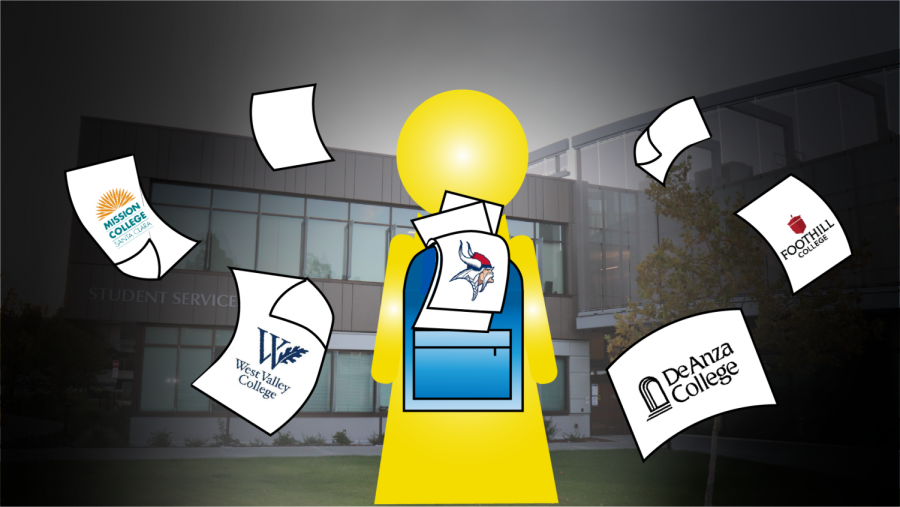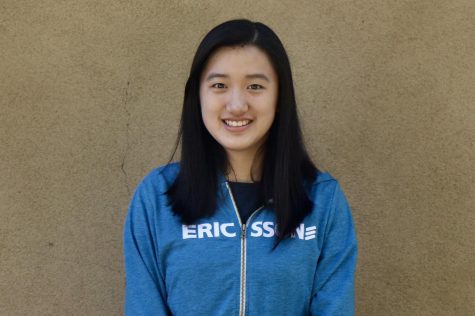Concurrent enrollment at community colleges spikes in fall quarter
Graphic illustration by Allison Hsieh; background photo by Bennie Chang
As the years pass, more students are beginning to take advantage of the opportunities that community college courses offer.
November 4, 2020
In the past, many students have taken community college courses on Lynbrook’s campus and on the campuses of various community colleges. Although community college courses have moved online, they are still available for high school students to pursue as additional academic enrichment. In fact, there was a noticeable influx of Lynbrook students enrolled in community college courses in the fall quarter this year.
“We as a Guidance Counseling Team probably sign somewhere near 500 concurrent enrollment forms every year, and that number is growing with each passing year,” guidance counselor Shana Howden said.
Several factors may have led to the increase in concurrent enrollment in remote learning. For example, with all community college courses online, the hassle of commuting that comes with in-person courses is eliminated. This new sense of convenience created a larger incentive for taking a course. The cancellation of many planned summer activities may have also contributed to the increase.
“Because of being in a remote learning situation, I think that because many programs and activities have been cancelled or changed, there was an increase in the number of people who thought, ‘If I can’t do this program or activity, I’ll take another class,’” Howden said.
While Lynbrook offers a wide variety of courses for students on its campus, there are still many classes only found at community colleges. For example, if a student wishes to explore Environmental Studies, they would need to take a course at De Anza College or another community college, as there is no equivalent course at Lynbrook. High schools can only create a class if enough students in the school are interested in the courses. Community colleges, however, have a larger student population, allowing them to offer a wider variety of courses.
“I feel like course material covered in community colleges is more niche,” said junior Jasmine Hou, who is taking International Marketing at De Anza College. “For example, the Principles of Business class I took in freshman year is more broad and basic, while the material in this class only focuses on business from an international perspective with more case studies and real life application.”
There are many ways Lynbrook students can take community college courses. The most common option is to enroll in a course created in partnership with a community college that is taught on a high school campus. In the past, Lynbrook students were able to enroll in community college courses at all of the other FUHSD high schools as well. For example, in the winter quarter of the 2019-2020 school year, Cupertino High School held a child development course in partnership with De Anza College, while Monta Vista High School held a calculus course in partnership with Foothill College. Lynbrook also offered West Valley College’s Intermediate Calculus course for students who have already finished AP Calculus BC and General Psychology on its campus after school from Monday to Thursday.
“At Lynbrook, we have developed a really great relationship with West Valley, partially due to our proximity to their campus,” Howden said. “West Valley has been bringing a rotation of math classes to the Lynbrook campus for well over a decade, and we have added a rotation of business, communications and humanities classes as well.”
This year, in addition to Intermediate Calculus, Lynbrook is also hosting Business Law with West Valley for students who need to fulfill the CTE course requirement for competitive business clubs like DECA and FBLA. FUHSD is also partnering with De Anza to offer International Marketing to students. As DECA transitioned from only requiring students to take one CTE course in all four years of high school to requiring a course every single year and FBLA started requiring CTE courses for competitions starting in 2019, demand for such courses skyrocketed. With the new partnership, students can continue participating in DECA and FBLA despite the space limitations in Lynbrook’s CTE classes.
Lynbrook students can also sign up for any other community college course by submitting the college’s Concurrent Enrollment form with the course and a counselor’s signature for approval. This has allowed many students who had already completed the math courses offered at Lynbrook to continue their mathematical pursuits by signing up for math classes elsewhere. Other popular classes include the Computer Science classes that teach C++ and Python due to the increasing popularity of programming languages in the job market.
Another option is the College Now program, formed in partnership with De Anza College. This program is only available to 10 interested seniors from each FUHSD high school, who are selected from a lottery. Selected students take English, Government and Economics at Lynbrook and fill the rest of their schedule with De Anza courses, with the requirement being that seniors already have sufficient high school credit for graduation. Such students have priority registration for De Anza courses over other concurrent enrollment students and have less restrictions on course selection compared to high school, which is a factor that draws many seniors to apply for the program.
“Besides the restriction of 21 units per quarter, you can basically take any course you want,” College Now student Alicia Chuang said. “For example, I am planning to take two math courses at the same time in the winter quarter, which is something that I could not have done at Lynbrook.”
Another advantage of community college courses is that students can earn college credits at one-tenth of the price of a college credit at University of California (UC) schools. College credit earned at community colleges can fulfill graduation requirements at many colleges like the UCs. For higher education institutions that do not recognize the credits, they help students demonstrate academic rigor to admissions officers, which can give students an edge in the college admissions process.
“If I count APs too, I have about 80 quarter credits that I can transfer to a UC at the end of my senior year,” Chuang said. “From this year alone, I can earn 50.5 credits, which will definitely give me a head start in college.”
Compared to high school classes, community colleges follow a more independent and flexible learning schedule. Classes are more lecture-based and less focused on in-class collaboration between peers, and students are expected to be accountable for their learning. This teaches high school students to become self-motivated learners, preparing them for college and beyond.
“In community college, teachers don’t hound you about due dates,” Chuang said. “You have to keep track of them yourself. If you miss them, you will simply receive a 0. Students are given full independence and must take full responsibility for their performance.”
While community college courses do not have in-class discussions, students are encouraged to seek support from others outside of the online classroom. As a result, many students have formed class-wide Discord channels to discuss confusing questions or concepts.
“My professor doesn’t give us answer keys for study guides to encourage us to communicate,” said senior Sowmya Mambakkam, who is taking Linear Algebra at West Valley College. “He usually has a rule of thumb of ‘If three people get the same answer, it’s probably right,’ and that is what people usually use Discord for.”
Because community college courses are in high demand during shelter-in-place and high school students have a lower priority for course registrations compared to college students and adults, many students were unable to register in time before spots filled up for first-choice courses. However, due to the large number of courses available, students are usually able to find alternatives.
As Lynbrook’s partnership with West Valley improves, more classes will be introduced to Lynbrook in the future. Lynbrook has brought many STEM-based classes to its campus, so it plans to branch out to humanities to increase variety. Lynbrook is scheduled to offer International Relations and Political Science in the second semester of the 2020-2021 school year, Psychology 1 in the 2021-2022 school year and Communications 1 in the spring quarter of 2022.
“Besides LHS’s partnership with West Valley College, our district has an official partnership with De Anza College, so we’re currently in the process of determining what classes we might be able to offer on the Lynbrook campus from De Anza College in the 2021-2022 school year,” Howden said.
Concurrent enrollment has opened up many opportunities for students to explore subjects beyond the Lynbrook curriculum in a classroom-like setting. As more students enroll each year, the program may continue to expand to other areas and offer more partnered courses in the future.


































































